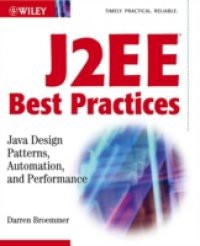Learn how to apply robust application design to your J2EE projects There are a number of best practices you need to consider to build highly effective J2EE components and integrate them into applications. These practices include evaluating and selecting the right set of software components and services to handle the job. In this book, Darren Broemmer supplies you with a set of best practices for J2EE development and then teaches you how to use them to construct an application architecture referred to as the reference architecture. The design and implementation of the reference architecture is based on a set of guiding principles that are used to optimize and automate J2EE development. In addition to the author's thorough discussions of the latest technologies for J2EE implementation-including EJB 2, Jakarta Struts, Servlets, Java Server Pages, UML, design patterns, Common Business Logic Foundation components, and XML-Broemmer addresses such topics as: Understanding J2EE application architecture Building business applications with J2EE, a business object architecture, and extensible components created with design patterns Designing and implementing a sample banking Web application Integrating proven performance-engineering and optimization practices in the development process Using metadata-driven, configurable foundation components to automate much of the development and processing of Web-based business applications The companion Web site contains the source code for a Common Business Logic Foundation and sample applications from the book, including a Jakarta Struts project and a banking application. Links to the Jakarta Struts frameworks and J2EE application servers such as BEA WebLogic and IBM WebSphere are also provided.

